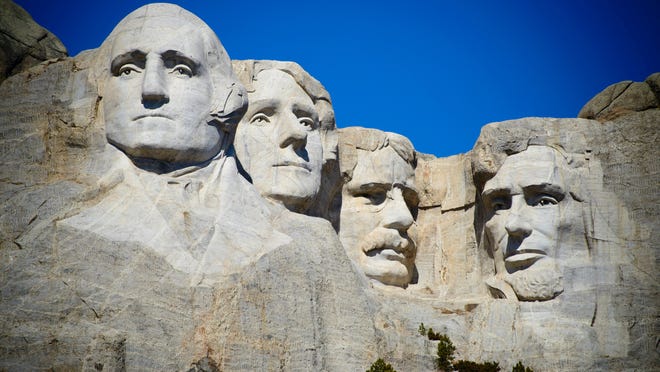Presidents Day is not just a day for an appliance sale. So who does it celebrate? Lincoln or Washington?
This Monday, take a few moments to think about George Washington and Abraham Lincoln.
We used to observe individual dates devoted to both of those famous presidents who remain among the most exalted to hold the office. And leading up to their birthdays, students in schools often spent time learning about their accomplishments.
Now, we have Presidents Day, better known as a national day of bargains on cars, mattresses, appliances, televisions and more.
"It's become more of a shopping day and a break in the calendar. Are we supposed to be honoring all the presidents that day? If so, how are we doing that?" said Douglas Brinkley, a presidential historian and professor at Rice University in Houston. "If it was Presidents Day in all the schools in the country and (teachers and students) were really looking at the executive branch, there might be something useful, but as it is now, it's more about a worker holiday than it is a day of intellectual reflection."
Even our calendars are confused. Microsoft Outlook lists Lincoln's Birthday (Feb. 12), but not Washington's Birthday (Feb. 22) or Presidents Day (Feb. 20). Google Calendar lists just Presidents Day.
Is Presidents Day a federal holiday?
In January 1879, George Washington's Birthday became the fifth federal holiday created by Congress, giving federal workers in the District of Columbia a paid day off, according to a Congressional Research Service report updated in July 2021. A decade earlier, Congress had established New Year’s Day, Independence Day, Thanksgiving Day and Christmas Day as federal holidays.
Washington's Birthday was first observed on Feb. 22, 1880, and five years later, federal workers in the 38 states had the holiday, too, according to the National Archives. And it was also the first federal holiday to honor a single person's birth date; the second, Martin Luther King Jr. Day, was signed into law in 1982.
After Lincoln's death in 1865, some sought to make his birthday (Feb. 12, 1809) a holiday, too. That effort failed, but several states continue to observe Lincoln's Birthday as a paid holiday, according to the National Constitution Center. And some schools across the U.S. still do have days off for the presidents' birthdays.
How did George Washington's Birthday become Presidents Day?
In June 1968, Congress passed the Uniform Monday Holiday Act, which established the observance of Washington's Birthday on the third Monday of February – Memorial Day, Veterans Day and Columbus Day were also moved to Mondays – a move that resulted in more three-day holidays for federal employees. It also resulted in Washington's birthday never being celebrated on his actual birthday, since the law took effect in 1971, notes the Mount Vernon website.
Within the Uniform Monday Holiday Act, Illinois Sen. Robert McClory suggested the renaming of the holiday to Presidents Day, to also celebrate Lincoln's birthday, according to History.com.
That suggestion was dropped from the proposal. But advertisers latched onto Presidents Day as another date for sales and promotions inflicting scores of fake Georges and Abes on us in their commercials.
Even though federal employees have the day as a holiday, the law did not officially change the third Monday of February to Presidents Day, so it remains Washington's Birthday. For instance, the National Weather Service and the Federal Reserve System continue to call the date Washington's Birthday.
In 2007, Rep. Carolyn Maloney of New York suggested Susan B. Anthony be added to those celebrated on the third Monday of February, but that measure was not acted on.
By the way, the Mount Vernon website suggests readers contact their representatives in Congress and them to fully bring back Washington's Birthday.
Brinkley would prefer Presidents Day have a name attached to it. "Once Martin Luther King Jr. Day became a national holiday, that became a day of intense reflection on our great civil rights icon," he said.
Lincoln deserves a more prominent date because of his guiding the country through the Civil War and issuing the Emancipation Proclamation, Brinkley said. "In a multicultural America, honing in on Lincoln probably is more fruitful than seeing if people can name the presidents in order," he said.

